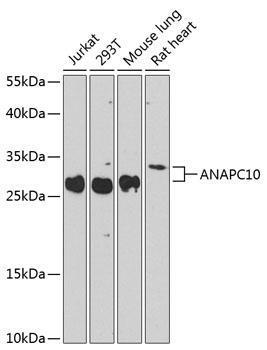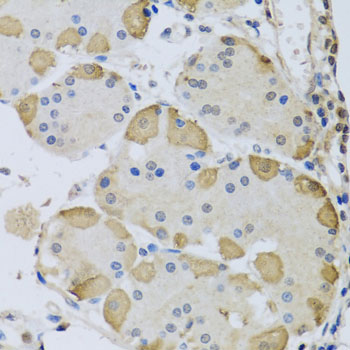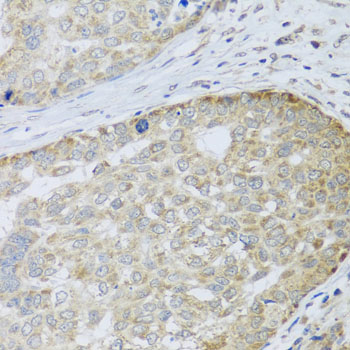-
Product Name
ANAPC10 Polyclonal Antibody
- Documents
-
Description
Polyclonal antibody to ANAPC10
-
Tested applications
WB, IHC
-
Species reactivity
Human, Mouse, Rat
-
Alternative names
ANAPC10 antibody; APC10 antibody; DOC1 antibody; anaphase-promoting complex subunit 10 antibody
-
Isotype
Rabbit IgG
-
Preparation
Antigen: Recombinant fusion protein containing a sequence corresponding to amino acids 1-185 of human ANAPC10 (NP_055700.2).
-
Clonality
Polyclonal
-
Formulation
PBS with 0.02% sodium azide, 50% glycerol, pH7.3.
-
Storage instructions
Store at -20℃. Avoid freeze / thaw cycles.
-
Applications
WB 1:500 - 1:2000
IHC 1:50 - 1:100 -
Validations

Western blot - ANAPC10 Polyclonal Antibody
Western blot analysis of extracts of various cell lines, using ANAPC10 antibody at 1:1000 dilution.Secondary antibody: HRP Goat Anti-Rabbit IgG (H+L) at 1:10000 dilution.Lysates/proteins: 25ug per lane.Blocking buffer: 3% nonfat dry milk in TBST.Detection: ECL Enhanced Kit .Exposure time: 60s.

Immunohistochemistry - ANAPC10 Polyclonal Antibody
Immunohistochemistry of paraffin-embedded human stomach using ANAPC10 antibody at dilution of 1:100 (40x lens).

Immunohistochemistry - ANAPC10 Polyclonal Antibody
Immunohistochemistry of paraffin-embedded human liver cancer using ANAPC10 antibody at dilution of 1:100 (40x lens).
-
Background
Component of the anaphase promoting complex/cyclosome (APC/C), a cell cycle-regulated E3 ubiquitin ligase that controls progression through mitosis and the G1 phase of the cell cycle. The APC/C complex acts by mediating ubiquitination and subsequent degradation of target proteins: it mainly mediates the formation of 'Lys-11'-linked polyubiquitin chains and, to a lower extent, the formation of 'Lys-48'- and 'Lys-63'-linked polyubiquitin chains.
Related Products / Services
Please note: All products are "FOR RESEARCH USE ONLY AND ARE NOT INTENDED FOR DIAGNOSTIC OR THERAPEUTIC USE"
